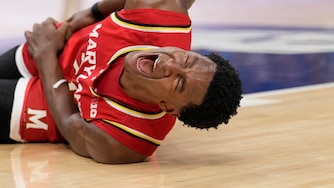On a late summer afternoon, 21 aspiring kindergarteners gathered for an important game of pretend.
The kids sat mostly crisscross applesauce on “sit upons” decorated with the letters of the alphabet. Their bright outfits and Crocs screamed lawless summer even as they learned to follow directions at story time. Though their careful attention waned by the end of the hourlong program, they were rewarded with the chance to board a bright yellow school bus and practice how to nonchalantly wave goodbye to tearful parents.
The kids were practicing their elementary school debut at Kindergarten Here We Come! hosted by the Howard County Library System and Howard County Public Schools. The last class is August 24 and it’s the kind of dry run educators say can help children — and their parents — feel more at ease on their first day of “big-kid school.”
Here are five other ways you can prepare your kindergartener.
Visit school before the first day
If your child’s school has a playground that you can access, a visit can be a good way to familiarize them with a new environment, said Jimmy Venza, executive director of The Lourie Center for Children’s Social and Emotional Wellness. And even better, if the school is open at any point before the start of the school year, take them for a walk through the hallways and to meet the new adults in their lives.
Kate Ayres is a former kindergarten and current second-grade teacher at Henderson-Hopkins school in East Baltimore. She said her school does a meet-and-greet with parents ahead of the first day so they can learn more about what they can expect while getting a feel for their child’s classroom.
Read More
“It allows the parents to get to know you and the students to get to know you,” Ayres said. “So the first day is not as intimidating for the kids.”
Tanya Morales brought her son, Adrien Lopez, to Kindergarten Here We Come! in the hopes that he could kick those initial nerves. The program proved difficult for the 5-year-old, who did everything asked of him while tears streamed down his cheeks.

Morales said she thought Adrien was afraid she would leave him there.
“I feel like maybe this whole thing made him feel like this is actual kindergarten, in a classroom where we have class. We have a teacher, we have books, we have music and kids,” Morales said. “He did great. He’s so strong.”
Adrien, clutching orange and yellow pencils, admitted he was scared about the year ahead. But the class did its job: He already felt better.
Establish a calendar, new routines
Venza recommended putting up a calendar at home so children can anticipate what’s happening next in their lives. Highlight milestones such as family vacations, the first day of class and other major school events happening throughout the year.
That can help set expectations and establish routines, such as getting ready in the morning or saying goodbye at drop-off.
Once at school, teachers will introduce their own routines, such as sitting on the carpet for story time, putting things away in cubbies or lining up before walking to the cafeteria. It’s “a lot of practicing how to exist in a school building” said Brittany Skinner, who taught kindergarten for eight years.
It takes kids a while to get good at those routines, which is why Skinner wouldn’t let parents back into the classroom until at least late October, when most kids had mastered daily expectations and gotten over the hump of separation anxiety.
“We have to figure out how to school, how to people, without our parents,” Skinner said.
Read all about the first day together
At Kindergarten Here We Come!, some of the students recognized Children’s Instructor and Research Specialist Evelyn Gerkin Greenberg, who changed her name from Ms. Evelyn to Ms. G for the class so the kids could practice calling teachers by their last names.
Greenberg read “The Night Before Kindergarten” to the class, encouraging them to read and rhyme alongside her.
Venza suggested reading books about going to school with your kindergartener and encouraging them to ask questions, or even asking some yourself. Listen closely to see what your child may be focused on or anxious about.

Parents and teachers suggested titles like “Monsters Love School,” “David Goes to School” and “Chrysanthemum.” Skinner and Ayres recommended “First Day Jitters,” which helps kids see they’re not alone in feeling anxious.
Be curious, every single day
When your child comes home from school, set aside 15 minutes to ask them open-ended questions about their day, Venza said.
Be prepared to share in their delight at trying something new or offer support if they’ve experienced something upsetting, like a classmate who hurt their feelings.
Hopefully, when something stressful happens, children will have an adult available. Malikah Arnaud brought her 5-year-old grandson, Amir Peterson, to the library event, where she was comforted watching Greenberg connect with children when they struggled.
“I hope they’ll have that same experience when they go into kindergarten, where you know if they’re a little apprehensive or uneasy that someone will be able to comfort them immediately,” Arnaud said.
But if your child is excited about something, let them lead that conversation. After the event, Amir rushed to tell his parents all about holding the crossing guard’s stop sign, Arnaud said.
Get to know their teacher
Venza said children grow and learn in the classroom best when the adults in their lives foster supporting, nurturing relationships.
“Children are coming from what is their most important relationship: with their parents,” Venza said. “And now, they are going to be spending more time with teachers. And so that teacher-student relationship then also becomes a central part of how kids will learn and grow all through their academic career, into work and into life.”
Venza said teachers and parents need to work together to support children trying out new ways of learning, especially because a kid may get stressed if they don’t master new subjects immediately.
Skinner said the relationship between parents and teachers is “vital” because kids may try to pit one against the other if they’re not on the same page, comparing it to children sneakily asking one parent for something if the first turns them down.
It also helps when both parties give each other grace, Skinner added.

“If teachers and parents come together and see each other as human beings first, that education of your child will transition a lot smoother,” Skinner said.
Above all, remember to treasure the memories of the first day — and everything leading up to it. Standing in front of the classroom, Greenberg encouraged parents to take a mental snapshot.
“I promise this day will bring tears when you think about it 10 years from now,” Greenberg said. “Or five years from now. Or a year from now.”
A parent added: “Or right now.”
About the Education Hub
This reporting is part of The Banner’s Education Hub, community-funded journalism that provides parents with resources they need to make decisions about how their children learn. Read more.





Comments
Welcome to The Banner's subscriber-only commenting community. Please review our community guidelines.